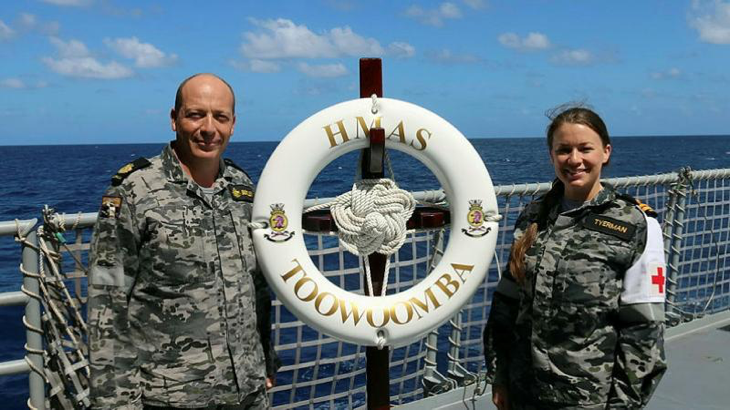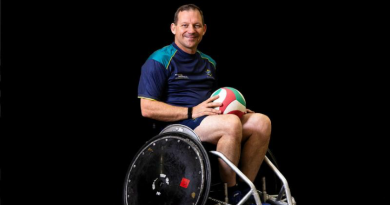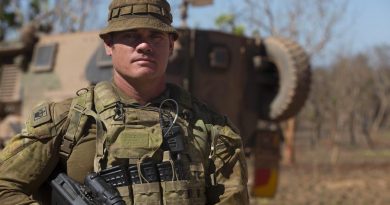The power of knowing your people

In 1995, a young able seaman writer from Ballarat joined HMAS Perth, and was put to work maintaining technical publications.
CAPTION: Warrant Officer Bentley, left, and Lieutenant Tyermann on board HMAS Toowoomba. Story by Lieutenant Commander Kieran Davis. Photo by Able Seaman Shaun Siltic.
Like many of the 18-year-old sailors living on board in those days, Able Seaman Dennis Bentley found himself frequenting pubs and clubs with his messmates and spending a significant portion of his salary out on the town.
As a country boy, living in a big city like Sydney with all of the entertainment and attractions, it was a hard temptation to resist, albeit a fascinating and amazing experience for a young sailor.
Consequently, he had little savings, and what he did save he was sending home to support his mother and two brothers.
Six months after Able Seaman Bentley posted to Perth, his supervisor, Chief Petty Officer Robert (Bob) Tyerman, sat him down for a fatherly, mentoring chat.
He was well aware of the weekly escapades of Able Seaman Bentley and the other junior technical sailors.
As a divisional senior sailor he also knew that Able Seaman Bentley’s father had tragically died when he was very young and that perhaps he had lacked a fatherly figure growing up.
Years later, the now Warrant Officer Bentley recalls the conversation.
“I am not sure what prompted Bob to sit me down for that particular divisional chat, or whether he had similar chats with the other young, mischievous sailors, but either way I am pretty sure he cared about my wellbeing and was trying to provide me some guidance,” he said.
“The conversation was along the lines of: ‘You are a smart, young man. So what are you doing wasting all your money on junior sailor indulgences? Why don’t you be a bit smarter with your money and start saving some to buy a house, as the sooner you start, the better off you will be in later life.’ ”
Warrant Officer Bentley reflected on the conversation later that day and decided it was wise and in his best interests to listen to Chief Petty Officer Tyerman.
From that point on, he started to save a good portion of his salary and within 12 months had purchased his first home in Ballarat, with his mother and two brothers moving in shortly after. His mother lived in the same house for the remainder of her life.
The equity in this property was eventually used to buy a home with his wife Meg, with whom he has two teenage children, Jamie and Bella.
Warrant Officer Bentley considers that divisional conversation as having had a profound impact on him.
It set his life on a course, both personally and professionally, that has enabled him to achieve a highly decorated and successful career with the Navy, as well as create a loving and caring life for his family.
Some 25 years after that conversation, Warrant Officer Bentley is now the Command Warrant Officer of HMAS Toowoomba – a prestigious head mark position for a warrant officer.
“I listened to the wisdom of my chief petty officer during a divisional chat 25 years ago, and from that point in time, my life and career in our Navy was positively impacted,” he said.
“I try to emulate the wisdom I received as a young sailor when I’m having discussions with our people in my current role.”
Earlier this year, while conducting his routine catch-up with Toowoomba’s new joiners, the ship’s doctor, Lieutenant Elicia Tyerman, entered his office.
Noting the surname, Warrant Officer Bentley informed her that he knew a Chief Petty Officer Bob Tyerman, and when Lieutenant Tyerman confirmed that the man in question was her father, Warrant Officer Bentley recounted his amazing story.
This wasn’t the first time Lieutenant Tyerman had been asked whether she was related to Chief Petty Officer Tyerman.
“After completing my undergraduate, New Entry Officer’s Course and a posting to HMAS Cairns Health Centre, I have met several sailors and officers who served with my father during his 48 years of service in the Navy,” she said.
A few days later, Lieutenant Tyerman informed Warrant Officer Bentley that after recounting the story to her father, Chief Petty Officer Tyerman did recall a young able seaman writer by the name of Dennis Bentley, and could even recall the advice he gave him that day.
“When I told Dad that I was posting to Toowoomba as the doctor, he asked me to keep an eye out for officers and sailors that he may have served with in his career,” she said.
“When I mentioned that Warrant Officer Bentley was the command warrant officer, he recognised the name and fondly recalled the advice he gave him so long ago,” Lieutenant Tyerman said.
“He was very glad that Dennis has done so well with his life.”
Lieutenant Tyerman often reflects on the advice her father gave her growing up, which was probably not dissimilar to the advice he gave to young sailors, like Able Seaman Bentley, under his charge.
“I was given similar advice countless times in my teenage and adult years, and I am extremely proud to have put that advice to good use in my personal and professional life,” she said.
Lieutenant Tyerman said her dad still remembered every sailor he spoke with, particularly those he considered had plenty to offer in life.
Part of her role as the ship’s medical officer is to provide counselling and mental health care to officers and sailors, and she routinely works with Warrant Officer Bentley to provide optimal level support at sea and alongside.
“Warrant Officer Bentley has been an immense help to myself and the medical team in supporting our crew when they have been experiencing difficulties,” she said.
“It is a pleasure to have someone on board who is so passionate about resilience and mental health wellbeing, and someone who advocates for putting Navy’s people first.”
Warrant Officer Bentley said this story highlighted the benefits of the Royal divisional system, and hoped it reinforced that the best investment Navy can make is the investment in its people.
“My story is but one example of the power of the Royal Australian Navy (RAN) divisional system, and I encourage our people who hold divisional responsibilities within their respective workplaces to really appreciate the profound impact that we have on our young officers and sailors,” he said.
“So take the time and effort to get to know your people.
“It is vital that we continue to demonstrate sound leadership and management, and remain positive advocates of service within the RAN moving forward.”
.
.

.
.





